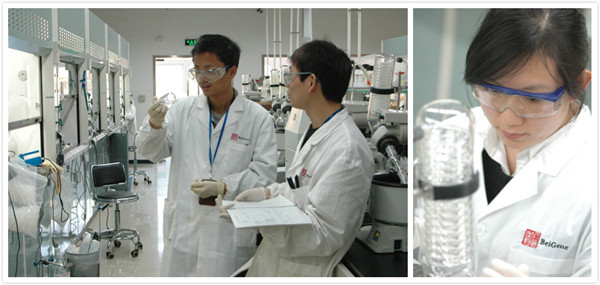
Two Chinese scientists (left) discuss use of equipment at the central chemistry lab of BeiGene in Beijing in May 2017. A BeiGene scientist (right) examines a sample during a test. (Photo provided to China Daily)
BeiGene's manufacturing might, R&D prowess, business nous drive expansion
Even without launching a single drug, BeiGene Ltd, a Chinese commercial-stage, research-based biopharmaceutical company listed on the Nasdaq Stock Market, saw its share price surge 220 percent last year, from $30 to $97.
Clearly, investors see immense growth potential in BeiGene, which is pressing ahead with its plan to offer cancer patients the world over innovative, molecularly targeted and immuno-oncology drugs.
Its latest move in this direction was a strategic collaboration with US-based global biopharmaceutical company Celgene Corp late last year.
Celgene received exclusive rights to develop and commercialize the investigational BGB-A317, an antibody-it was developed by Chinese scientists at BeiGene's R&D center in Beijing-that could help in the treatment of solid tumors, in the United States, Europe, Japan, and the rest of the world excluding Asia.
BeiGene will acquire Celgene's commercial operations in China and assume commercial responsibility for Celgene's approved therapies in China and the pipeline agent CC-122.
BeiGene will receive an aggregate of $413 million from Celgene in upfront licensing fees and equity investment, and will be eligible for up to an additional $980 million in development, regulatory, and sales milestones, as well as royalties on future sales of BGB-A317.
"In its niche, BeiGene strives to become an innovative global leader in R&D," said Wang Xiaodong, founder and director of BeiGene. "We aim to develop more effective new drugs, achieve better treatment for patients and enhance the quality of their life."
WHO data show each year 8.8 million people, or one-sixth of the annual death toll, die from cancer. Wang said BeiGene's vision is to develop new drugs through numerous innovations to benefit mankind.
John Oyler, CEO of BeiGene, said cooperation with Celgene has resulted in access to mature commercialized oncology product lines, sales channels, and after-sales service, in addition to its world-class new drug R&D capability.
From a local biotech company mainly engaged in R&D, BeiGene is set to emerge as an integrated global biopharmaceutical enterprise.
Oyler said, "We hope our highly effective cancer drugs can fulfill a great deal of unmet medical demands and benefit more patients."
BeiGene is also promoting clinical trials and commercialization of BGB-A3111, a drug that is currently being evaluated as a monotherapy and in combination with other therapies to treat various lymphomas.
As of March 20, 2017, trials of BeiGene's four clinical-stage drug candidates, as monotherapies and in combination, have enrolled over 980 patients.
Liang Heng, chief financial officer of BeiGene, said the company regards Beijing as an R&D center. Hence, its macromolecular biotics manufacturing base is under construction in Guangzhou, Guangdong province. The existing base in Suzhou, Jiangsu province, can produce up to 100 million capsules annually, meeting the demands of up to 50,000 patients.
In March, BeiGene invested 2.2 billion yuan ($332.5 million) in the Guangzhou facility, which will start production in 2019. Eventually, the two plants will produce new drugs that are in clinical research stage now and yet to be commercialized.
"We are largely developing clinical trials around the world, including China, the United States and Australia," said Liang. "Our next destination is Europe."
Liang said China has much talent in pharmaceutical R&D, but there are fewer people experienced in clinical trials. So it is important to seek global teams and have cooperation.
According to him, BeiGene is working with renowned local doctors on clinical trials because if they look good on the innovative drugs, commercialization will be easier later.
Sang Guowei, member of the Chinese Academy of Engineering, said, "Innovative drugs are a key means to save patients and enhance an enterprise's competitiveness. We are pleased to see that Chinese biopharmaceutical companies such as BeiGene have achieved remarkable progress, driven by both innovation and capital."
According to the IMS Health, the China pharmaceutical market has grown robustly and replaced Japan as the world's second-largest in 2013.
According to IMS Market Prognosis, the market was worth $109 billion in 2014, much less than its US counterpart, which was worth $373 billion. But the China market is expected to grow at a compound annual growth rate of 9.3 percent over the next five years, so as to reach $171 billion by 2019.


















































